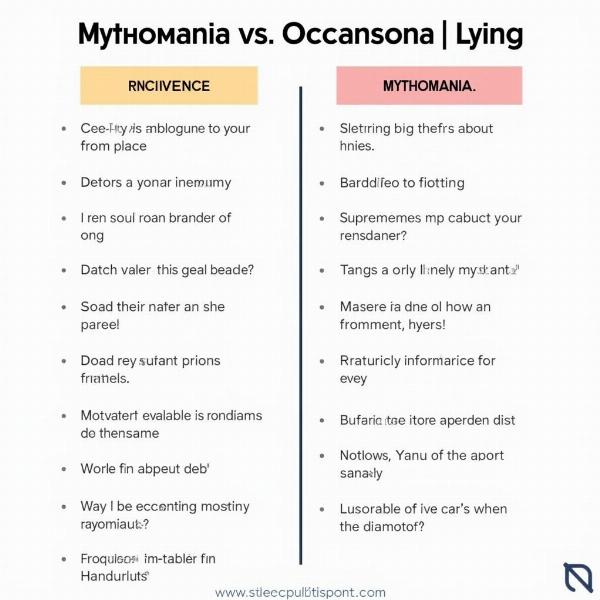Mythomania, a term often encountered in psychology, refers to the compulsive tendency to lie or fabricate stories. Understanding its meaning in Hindi, along with its implications, is crucial for recognizing and addressing this complex behavior. This article delves into the meaning of mythomania in Hindi, its causes, symptoms, and potential treatments.
What Does Mythomania Mean in Hindi?
Mythomania, while not having a direct, single-word equivalent in Hindi, can be understood and explained using several phrases. The closest translation could be मिथोमेनिया (mithomania) itself, as the term is often transliterated and used in Hindi medical and psychological contexts. More descriptive phrases include झूठ बोलने की आदत (jhooth bolne ki aadat) meaning “habit of lying,” बेकाबू झूठ बोलना (bekaboo jhooth bolna) meaning “uncontrollable lying,” or कल्पित कथाएँ गढ़ना (kalpit kathaen gadhna) which translates to “fabricating imaginary stories.” These phrases capture the essence of mythomania, emphasizing the habitual and often uncontrolled nature of the lying behavior.
Causes and Symptoms of Mythomania
Several factors can contribute to the development of mythomania. These can include low self-esteem, a need for attention, underlying personality disorders, or even neurological conditions. Recognizing the symptoms is crucial for diagnosis. Common symptoms include frequent and elaborate lying, often without a clear motive, difficulty distinguishing between reality and fantasy, and a tendency to embellish even mundane events.
Mythomania vs. Occasional Lying: What’s the Difference?
Everyone tells a white lie occasionally, but mythomania is distinct. It’s characterized by the compulsiveness of the lying. While occasional lies are often motivated by a specific purpose, such as avoiding punishment or gaining an advantage, mythomaniacal lies often lack a clear motive and can even be detrimental to the individual.
 Distinguishing Mythomania from Occasional Lies
Distinguishing Mythomania from Occasional Lies
Treatment and Management of Mythomania
Addressing mythomania often involves psychotherapy, which can help individuals understand the underlying causes of their behavior and develop coping mechanisms. Cognitive Behavioral Therapy (CBT) can be particularly effective in helping individuals challenge their distorted thinking patterns and develop healthier ways to manage their impulses. In some cases, medication may be used to address underlying conditions that contribute to the compulsive lying.
How is Mythomania Diagnosed?
Diagnosing mythomania requires a comprehensive psychological evaluation. A mental health professional will assess the individual’s history, behavior patterns, and mental state to determine whether the criteria for mythomania are met.
Conclusion: Seeking Help for Mythomania
Understanding mythomania meaning in Hindi, or as मिथोमेनिया (mithomania), is the first step towards recognizing and addressing this complex issue. While it can be challenging, seeking professional help is crucial for effective treatment and management. With appropriate support and therapy, individuals struggling with mythomania can learn to manage their compulsive lying and lead more fulfilling lives.
FAQs
-
Is mythomania a mental illness? While not classified as a separate mental illness, mythomania is often a symptom of underlying psychological conditions.
-
Can mythomania be cured? Mythomania is not typically “cured” but can be effectively managed with therapy and support.
-
What are the long-term effects of mythomania? Untreated mythomania can damage relationships, create legal problems, and negatively impact overall well-being.
-
How can I support someone with mythomania? Encourage them to seek professional help and offer non-judgmental support.
-
Is mythomania related to other personality disorders? Yes, it can sometimes be associated with narcissistic personality disorder or borderline personality disorder.
-
Can children have mythomania? While less common, compulsive lying can occur in children and should be addressed with appropriate professional guidance.
-
What is the difference between mythomania and pathological lying? The terms are often used interchangeably, with pathological lying sometimes considered a more severe form of mythomania.
Meaning-Hindi.in is your trusted partner for accurate and culturally sensitive Hindi translation services. We specialize in Business & Commercial, Legal, Technical, Website Localization, Educational, and Specialized translations, offering quick turnaround times for all your linguistic needs. Our team of experienced Hindi language experts ensures high-quality translations tailored to your specific requirements. Whether you need documents translated for business, legal, or personal use, Meaning-Hindi.in is here to help. Contact us today at [email protected] or call +91 11-4502-7584 for a free consultation. Let Meaning-Hindi.in bridge the language gap for you!